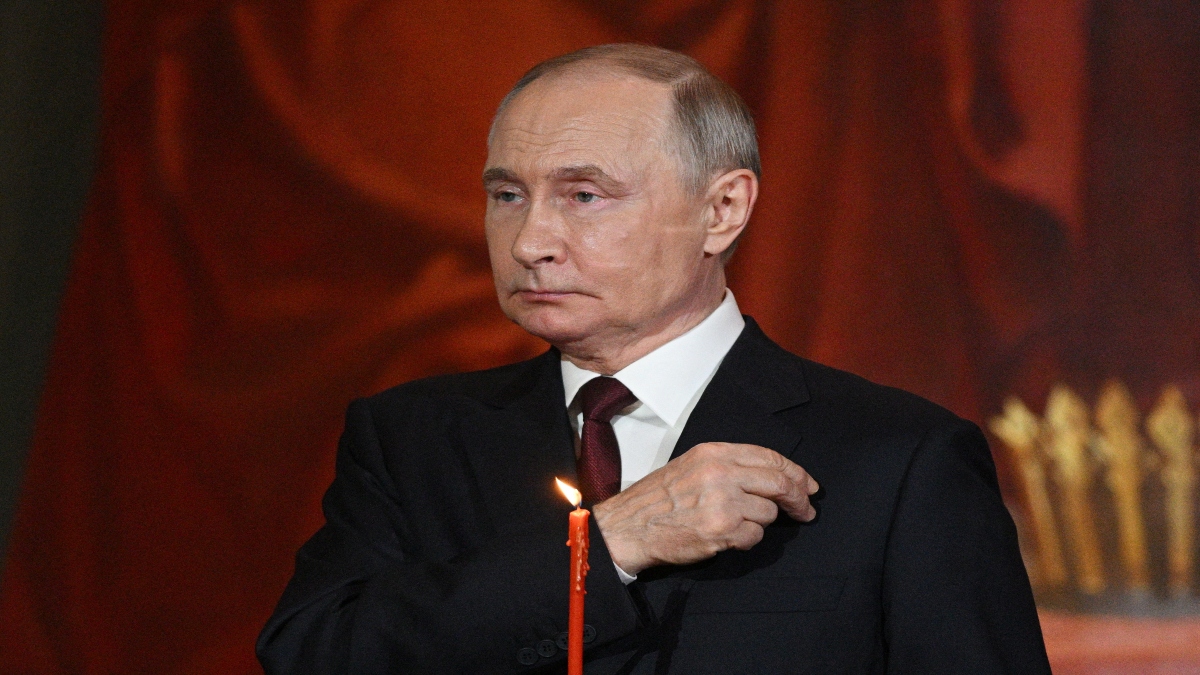Russian President Vladimir Putin has proposed resuming direct negotiations with Ukraine in Istanbul on 15 May ‘without preconditions’. Addressing journalists at the Kremlin in the early hours of Sunday, President Putin suggested a ‘restart’ of the peace talks previously held between Russia and Ukraine in 2022.
His comments followed a warning from the leaders of four major European nations, who threatened to intensify pressure on President Putin should he refuse an unconditional 30-day ceasefire in Ukraine, offered on Saturday as a display of unity with Kyiv. However, only two days ago, Putin looked to aim for victory over Ukraine while addressing the Victory Day parade in Moscow on Friday.
Why Putin calls for peace now
The leaders of France, the United Kingdom, Germany and Poland stated that their ceasefire proposal, set to commence on Monday, had the backing of US President Donald Trump, whom they had briefed by telephone earlier in the day.
President Putin did not directly respond to the latest ceasefire proposal in his remarks on Saturday, although Kremlin spokesperson Dmitry Peskov had earlier told CNN that Moscow would consider it.
Russia’s own unilateral three-day ceasefire, declared to mark the 80th anniversary of the victory over Nazi Germany, expires on Saturday. Ukraine has accused Russian forces of repeatedly violating this truce. In March, the United States proposed an immediate, limited 30-day truce, which Ukraine accepted, but the Kremlin has insisted on terms more favourable to Russia.
Ukrainian President Volodymyr Zelenskyy, speaking alongside the European leaders in Kyiv, described their meeting as ‘a very important signal’.
In a joint statement published on President Zelenskyy’s official website, the five leaders called for a ceasefire ‘lasting at least 30 days’ from Monday, to allow space for renewed diplomatic efforts to end the conflict.
Impact Shorts
More Shorts‘An unconditional ceasefire by definition cannot be subject to any conditions. If Russia calls for such conditions, this can only be considered as an effort to prolong the war and undermine diplomacy,’ the statement read.
The mounting pressure
French President Emmanuel Macron said the United States would take the lead in monitoring the proposed ceasefire, with support from European nations, and warned of ‘massive sanctions … prepared and coordinated, between Europeans and Americans’ should Russia breach the truce.
President Macron travelled to Kyiv with British Prime Minister Keir Starmer, German Chancellor Friedrich Merz and Polish Prime Minister Donald Tusk.
‘This is Europe stepping up, showing our solidarity with Ukraine,’ said Prime Minister Starmer.
Retired Lieutenant General Keith Kellogg, President Trump’s special envoy to Ukraine, stated on Saturday that a ‘comprehensive’ 30-day ceasefire, covering attacks by air, land, sea and on infrastructure, ‘will start the process for ending the largest and longest war in Europe since the Second World War’.
Progress towards ending the three-year war has been elusive since President Trump’s return to the White House, with previous claims of imminent breakthroughs failing to materialise. President Trump has previously urged Ukraine to cede territory to Russia in order to end the conflict, threatening to withdraw American support if an agreement proves too difficult.
The US factor in Russia-Ukraine peace talks
Since the commencement of US-mediated talks, Russia has continued its assaults along the roughly 1,000-kilometre front line, including deadly strikes on residential areas lacking clear military targets.
The proposed ceasefire would halt fighting on land, at sea and in the air. European leaders have threatened to escalate sanctions, including measures targeting Russia’s energy and banking sectors, if President Putin does not comply.
But there is scepticism
Ukrainian Foreign Minister Andrii Sybiha stated that the priority was to make continued Russian aggression in Ukraine prohibitively costly.
When asked about the monitoring mechanism, Sybiha told the Associated Press that details were still under discussion.
Addressing scepticism regarding fresh sanctions against Moscow, which has thus far managed to sustain its campaign, Chancellor Merz said, ‘almost all member states of the European Union and a large coalition of the willing around the world are determined to enforce these sanctions even if our initiative of the weekend should fail’.
Security guarantees, a key factor
The leaders also discussed security guarantees for Ukraine.
Strengthening Kyiv’s military capabilities will be crucial in deterring Russia and will require the supply of significant quantities of arms and investment in Ukraine’s defence sector. President Macron added that a force comprising foreign troops could also be deployed as an additional ‘reassurance’ measure.
He noted that details regarding potential European deployments to Ukraine were still being finalised. No mention was made of Nato membership, which remains Kyiv’s preferred security guarantee.
Earlier on Saturday, the European leaders joined a ceremony at Kyiv’s Independence Square to mark the 80th anniversary of the end of the Second World War. They lit candles alongside President Zelenskyy at a makeshift flag memorial dedicated to Ukrainian soldiers and civilians killed since Russia’s invasion.
But Russian attacks persist
Russian shelling in Ukraine’s northern Sumy region over the past day killed three residents and wounded four more, according to local officials. Another civilian was killed on Saturday when a Russian drone struck the southern city of Kherson, according to regional Governor Oleksandr Prokudin.
The US Embassy in Kyiv on Friday warned of a ‘potentially significant’ Russian air attack in the coming days, without providing further details.
In November, Russia gave the United States brief advance warning before striking Ukraine for the first time with its Oreshnik intermediate-range ballistic missile, an experimental hypersonic weapon which President Putin claimed could travel at ten times the speed of sound.


)

)
)
)
)
)
)
)
)



